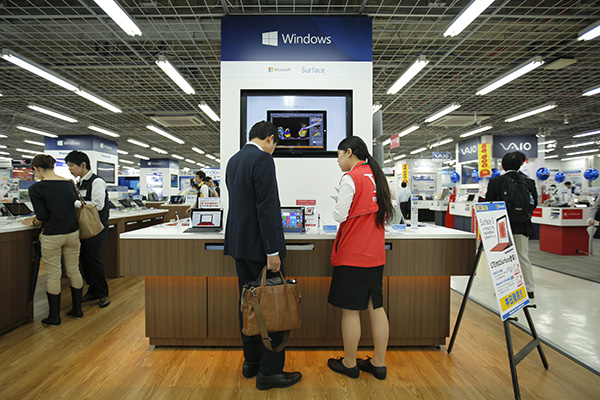 |
|
A Bic Camera Inc electronics store in Tokyo. [Photo/Agencies] |
I had to choose a material for the inner cooking bowl: copper, iron, stainless steel, or ceramic. Then which variety of rice I wanted to cook: chewy, tender and soft, or ever traditional clay-pot-cooked. The choices seemed endless.
Japan-made rice cookers were top of almost every "must-buy" list my friends recommended to me before I left for my week-long vacation on the country's Hokkaido island in July.
Other items high on the lists included Japanese electric tooth brushes, hair dryers, stainless steel vacuum mugs, ceramic knives, and of course, toilet seats equipped with warmers and cleaning sprays.
Continuous depreciation of the Japanese yen has made shopping there a lot more affordable for Chinese.
In the past it was common to see luxury handbag shops jammed with Chinese travelers. But now they are expanding their antenna to high-quality everyday necessities.
Retailers such as Bic Camera, which occupied the first four floors of the mall I visited in Sapporo, are packed with Chinese tourists, busily checking lists of must-buy items stored on their smartphones.
Often classified by travel operators as "high-quality travelers", this group of largely middle-class spenders focus their trips on catering, sightseeing and shopping.
With relatively higher disposable incomes, they are less-price sensitive than their predecessors and are willing to pay more for better technology and higher quality.
The consumption demand of these people is huge and growing, but as more venture further afield to buy their goods, they are also starting to put pressure on a sector in China already under huge strain: The manufacturing industry.
China became the world's top manufacturer by output in 2010, according to IHS Global Insight, the US-based economics consultancy.
Made-in-China products, with relatively lower prices, have enabled many in the world to improve their standard of living.
As China's labor-cost advantages weakened, however, swathes of the domestic manufacturing industry have been moving to Southeast Asia. The damaging effect of that shift has been accentuated, too, by the accelerating progress of "re-industrialization" in developed countries.
